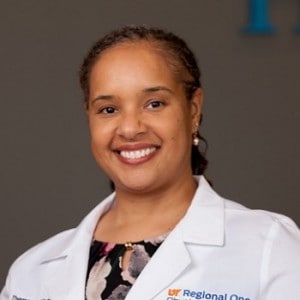By Theresa Woodard, MD, internal medicine practitioner at Harbor of Health
February’s American Heart Month is a great time take charge of your cardiovascular health, and a primary care physician like our team at Harbor of Health is a great resource to start with.
We can determine your risk of cardiovascular disease through a routine exam and testing, and can recommend lifestyle changes, prescribe medications and refer you to a specialist if needed.

Primary care physicians like Dr. Theresa Woodard at Harbor of Health can help patients improve cardiovascular health.
When you ask your primary care doctor about your heart health, he or she will likely ask about your lifestyle and medical history, as certain behaviors like smoking, drug use, sedentary lifestyles, a family history of heart disease and a diet high in fat, sodium and processed sugars can all increase your risk.
Physicians will also find out how you feel. Do you tire easily? Do you get out of breath or feel light-headed after exertion? All of these can indicate your heart isn’t working at its optimal level.
It’s important to answer honestly and with as much detail as possible. Remember, we’re here to listen and help you get on the right track. We don’t judge, and we don’t share your information.
Doctors can also run a number of tests to determine your heart health, starting with something as simple as getting your accurate weight – being overweight is a major contributor to heart disease.
Other tests primary care doctors may perform include:
- Checking your pulse with their fingers and listening to your heart with a stethoscope to check for beats per minute, strength and regularity.
- Using a cuff to check for high blood pressure, which is linked to heart attack. Normal blood pressure is less than 120 systolic (when your heart beats or squeezes) over less than 80 diastolic (when your heart is relaxed between beats).
- Performing a blood test to check cholesterol. Risk of heart disease goes up if your total is over 200, HDL (good) is under 40, LDL (bad) is over 120, and triglycerides are over 150.
Once your doctor has a snapshot of your heart health, they can work with you on treatment.
If you need additional tests or care, they’ll likely refer you to a cardiologist or another specialist. But many patients can simply make healthy changes with the help of their primary care doctor: even small changes can lower your heart disease risk by up to 80 percent.
Here’s what you can do:
- Quit smoking. It doubles your heart attack risk and makes it more likely you’ll die if you do suffer cardiac arrest.
- Eat a balanced diet low in cholesterol, saturated fat, salt and refined sugars and high in fiber, vitamins and minerals to maintain healthy cholesterol and blood pressure, weight, etc. My advice is to eat more fruits, vegetables, whole grains, beans, nuts, legumes and plant-based foods, plus modest portions of fish, poultry and lean meat.
- People who are sedentary are more likely to get and die from heart disease.
- Manage stress: Exercise, meditate, talk to friends or a therapist, spend time on hobbies, etc. Everyone has a different way of dealing with stress, so find what works for you.
If needed, your doctor can also prescribe medications to address issues like high cholesterol and blood pressure. These medications are highly effective and typically have few side effects, and your doctor can find the best product and dosage for you.
Take heart – while cardiovascular disease is a scary subject, there’s plenty you can do. February is the month we celebrate love, and remember the best gift for those near and dear to your heart is more time together, so make an appointment to get yourself on track.
See me at Harbor of Health, 718 Harbor Bend Road. Walk-ins are welcome, and you can make an appointment at www.regionalonehealth.org/appointments or 901-515-4200.
